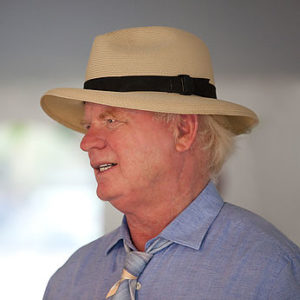Tag: bays

You are invited to attend our Annual Meeting to hear an important talk by Dr. John Todd, one of the co-founders of the New Alchemy Institute and the first winner of the Buckminster Fuller Challen
ge for, “the best idea to help humanity.” Dr. Todd will speak about his approach to restoring marine and fresh bodies of water stressed by nutrients. Considering the most recent report on Waquoit Bay and the time it will take for a plan to address waste water at its source, this is an option that should be considered.
In addition, James Rassman will tell us about the historical significance of Washburn Island as a training site for soldiers who participated in the D-day landings.
DATE: Wednesday, August 25th
TIME: 6:30 PM
PLACE: WBNERR boat house, 131 Waquoit Hwy., (Rte.28), East Falmouth, MA 02536
Desserts and coffee will be provided.
Dr. John Todd, Ph.D. is the President of Ocean Arks International and Professor Emeritus at the University of Vermont in the Rubinstein School of Environment and Natural Resources. He is a former assistant scientist at the Woods Hole Oceanographic Institute and the cofounder of the New Alchemy Institute on Cape Cod. He has pioneered ecological design and engineering and applied ecological concepts around the world to help solve major environmental issues. He is the inventor of eco-machines, technologies for wastewater treatment, environmental restoration and for the production of aquatic and terrestrial foods. In 2008 he became the first winner of the R. Buckminster Fuller Challenge for the “best ideal to help humanity.” His entry was entitled Design for a Carbon Neutral World? The Challenge of Appalachia.
Did you see us in the Mashpee Enterprise this week? CPWB recently sent a letter to the Falmouth and Mashpee Select Boards, Conservation Commissions, and Falmouth Water Quality Management Committee alerting them to the extremely dangerous situation developing in our bays and estuaries.
According to the current plan to mitigate wastewater, it will be 15 years before treatment systems are in place in Waquoit Bay. CPWB supports the plan, but also offers a few reminders and encourages some action now:
- Road Runoff Remediation is often overlooked as a minor part of the overall nitrogen problem, but choosing an appropriate and effective technology is important. Conventional road runoff catchment basins do not remove nitrogen or phosphorus, but vegetated swales that are well maintained do. Both are permanent improvements not likely to be revisited for decades, so it is important that we make a thoughtful choice about which technology to use with lasting implications for the area served in mind.
- Storm water runoff is a small contributor of the nitrogen load, but it has an outsized capacity to stress the ecosystem by carrying heavy metals, hydrocarbons, ,and pathogens toxic to fish and shellfish. Climate change is only going to make this worse and is an imminent danger to our bays.
- Heavy rain exacerbates the already serious impact of road runoff because it deposits pathogens, metals (from tire rubber), and hydrocarbons (exhaust residue, oils, and other automotive fluids) that kill fish and close shellfish beds and swimming beaches. That rain is getting heavier over time thanks to Climate Change, which has created more intense rainfall events that deliver more rain over shorter time periods after extended dry spells. These heavy rainfalls have the potential to cause massive fish kills and shellfish bed closures.
At the very least, there should be no road runoff into any estuary’s watershed, especially Waquoit Bay, which is recognized as an Area of Critical Environmental Concern and a significant nursery for several important fisheries. There are simple and affordable solutions including vegetated buffers, rain gardens, and infiltration systems that provide effective treatment of stormwater to remove nitrogen and phosphorus among other toxins.
It is vitally important to the marine ecology and tourist industry to protect our bays and estuaries. CPWB and other local interest groups are committed to documenting the most egregious sources of road runoff to Waquoit Bay and its three tributaries and educating the public about the dangers of runoff and mitigation efforts. We call on Town boards and committees to recognize and address this potentially disastrous situation now by forming an ad hoc committee to make recommendations and investigate sources of further funding.
You can see our letter in full here.
